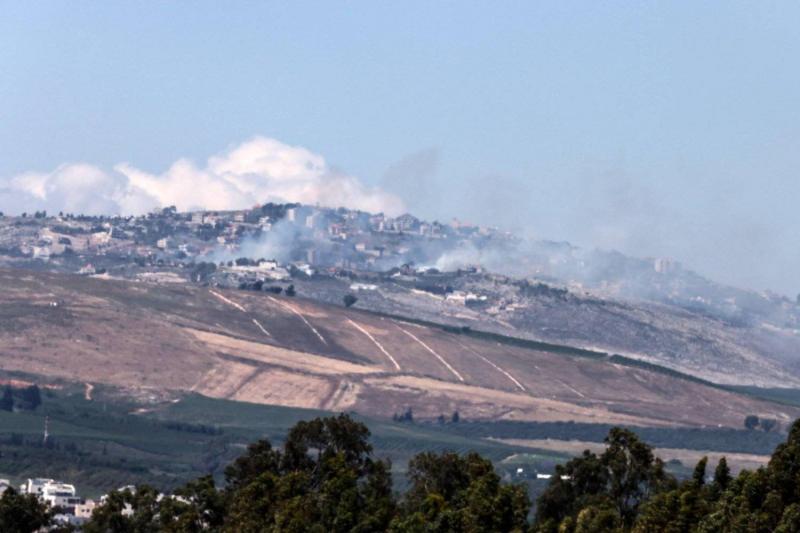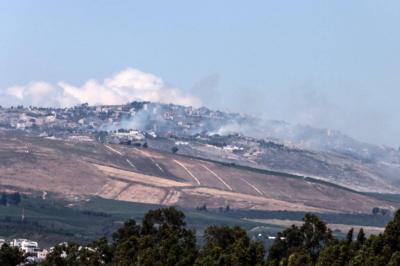A prominent Lebanese parliamentary source views the recent Israeli strike on a Hezbollah weapons depot in the southern coastal town of Adloun as part of Israel's insistence on "provoking" the party into expanding the war. This, according to the MP source speaking to "Asharq Al-Awsat," "will not happen." The source confirms that "the party's response remains under the threshold of pressure on Israel to prevent it from exceeding the rules of engagement, which it seeks to maintain without allowing it to escalate its aggression by targeting Lebanese towns outside the southern Litani area, as well as military leaders and cadres throughout the Bekaa region."
The source points out that Hezbollah's targeting of Israeli territory is a response to Tel Aviv's attacks on Lebanese territory, stating that "the ongoing confrontation in the south remains governed by a balance of deterrence, and the party will respond similarly to any violation of the rules of engagement."
The same source reveals that the Speaker of Parliament Nabih Berri, in ruling out the current expansion of the war, is basing his assessment on that the American mediator Amos Hochstein, in his communication with him, still hopes to achieve a ceasefire on the Gaza front, which is expected to automatically extend to southern Lebanon. This would allow him to move to Beirut for negotiations aimed at discussing a settlement that would restore calm and stability to the northern front under the application of Resolution 1701.
### Netanyahu's American Plan
The source asserts that Israeli Prime Minister Benjamin Netanyahu, who is preparing to travel to Washington in the coming hours to meet with President Joe Biden and deliver a speech before the U.S. Congress, seeks to impose a fait accompli in the south to improve his negotiating conditions, whether through indirect negotiations with Hamas to reach a ceasefire agreement in Gaza or through the American mediator tasked with calming the situation in southern Lebanon.
It is noted that everyone is awaiting the results of Netanyahu's discussions with senior officials in the U.S. administration, which will be closely monitored at the official level. The source believes that Netanyahu's presence in Washington serves as a test of the U.S. administration's readiness to translate its commitments regarding the exclusion of expanding the war to include southern Lebanon, a stance advised by Lebanese leadership and Hezbollah, albeit indirectly, either through Paris or through communication between the party and Germany, represented by the deputy head of its intelligence agency.
### A Sample of Expansion
In this context, a prominent political source confirms that the party communicates to all who reach out to it, starting from the leadership of the international peacekeeping force "UNIFIL" in southern Lebanon to France, that it has no intention of expanding the war. However, it will not remain silent if Tel Aviv crosses red lines and will be forced to respond in kind. The source states that what is currently happening in the south is merely a sample of an expanded war, despite high-ranking official entities ruling out a shift toward comprehensive expansion, although they express satisfaction with reassurances, particularly European and American ones, regarding the non-expansion of the war, which is not conclusive from their point of view.
These parties, as per their sources to "Asharq Al-Awsat," rely on the party's ability to manage the general course of military confrontation with Israel, considering the accuracy of the situation, and therefore, its field leadership will not risk underestimating the response to Israel's continued aggression that could lead to an expansion of the war.
These sources do not rule out that the south may witness unprecedented escalation, given Netanyahu's readiness to head to Washington, stemming from his insistence on employing hot diplomacy to impose his conditions on both the Gaza and southern fronts, unless he refrains from expanding the war due to lacking American political support, as Washington does not favor it to maintain stability in the region unless it revises its position.
### An Iranian-American Meeting Point
Maintaining stability in the region constitutes a point of convergence with Iran despite their differences, as Iran uses its regional proxies to push for a ceasefire in Gaza, due to its lack of interest in a scorched earth policy, as these same parties argue, especially as Washington is currently in a transitional phase ahead of the upcoming presidential elections in November.
Therefore, the Israeli strike targeting the port of Hodeidah in Yemen aims not just at responding to the Houthis, who claimed responsibility for launching a drone that hit a building in Tel Aviv, but also intended by Tel Aviv, under American cover, to send an initial message to Tehran regarding its support for this group, culminating in the pressure on it to reconsider its strategies to prevent the use of its regional proxies.
Thus, the nature of the confrontation in the south remains open to the outcomes of Netanyahu's anticipated visit to Washington and cannot be isolated from the overarching trajectory it is expected to follow, as there is a necessity to assess the extent of the U.S. administration's readiness to amplify its intervention, which will not be within reach unless it initially envelops the Gaza sector, allowing Hochstein to reactivate his efforts to reach a settlement on the southern front.




